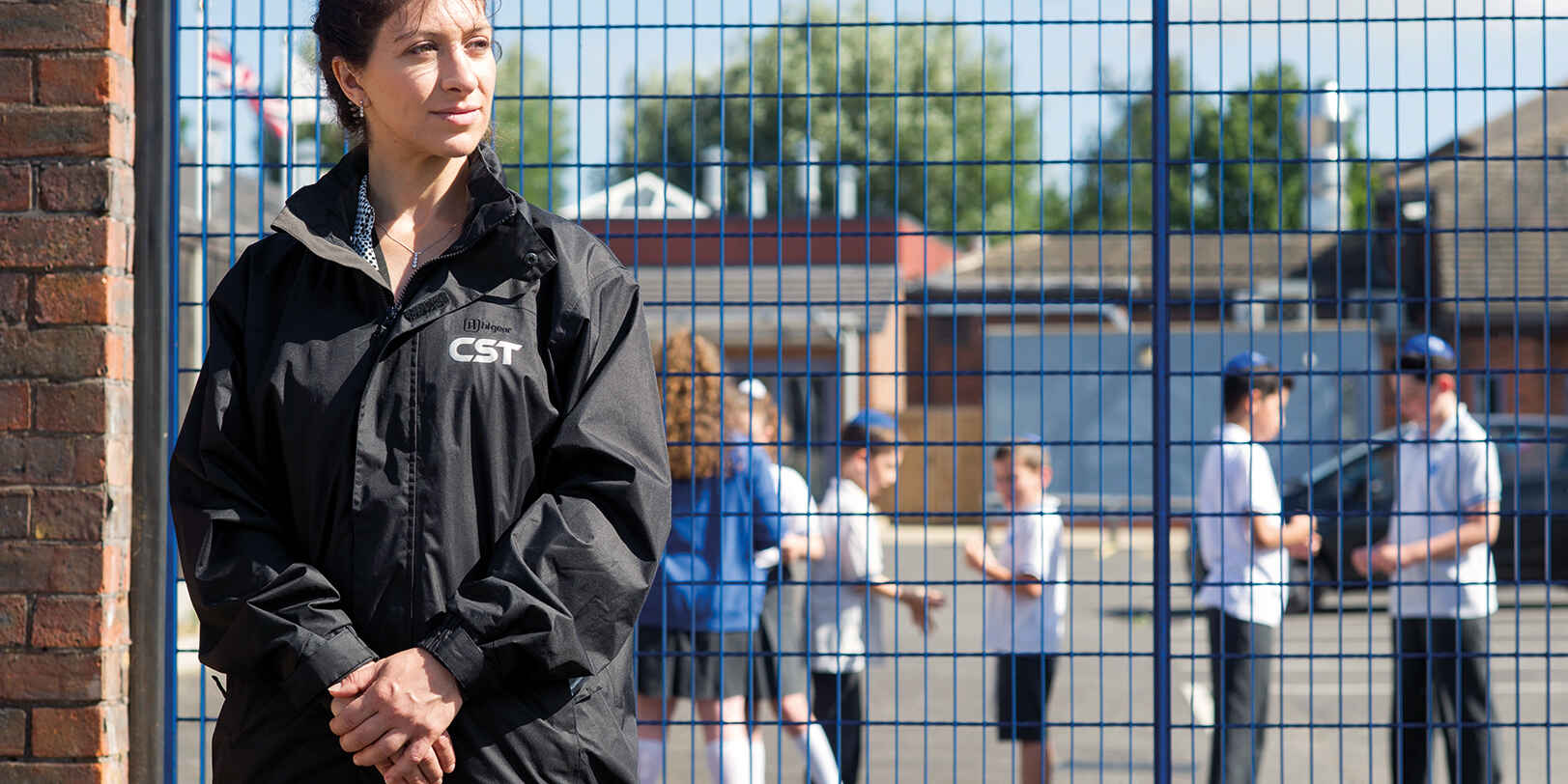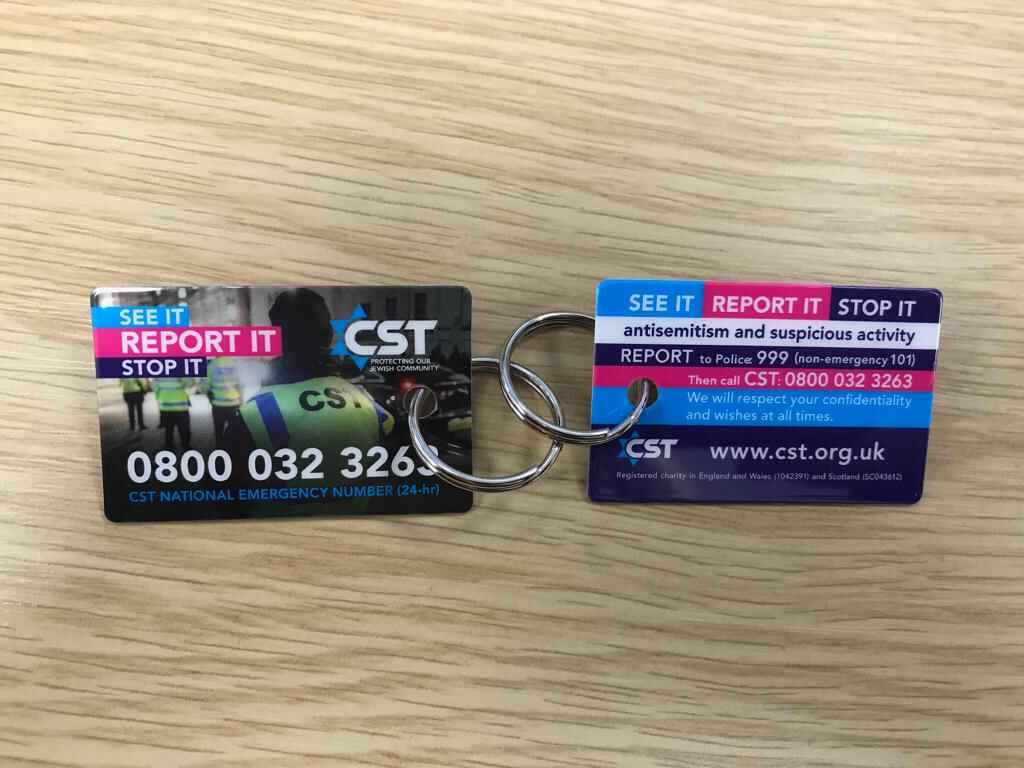CST Blog
The CST Keyring Project: raising awareness of the importance of reporting antisemitism
19 March 2019

CST has produced ‘CST Report’ keyrings with contact details to make it as easy as possible for people to report antisemitism or suspicious activity to CST. These keyrings have been distributed at a number of Jewish secondary schools from across the religious spectrum this year, with the intention that pupils have CST’s contact information when they need to report something. In several schools, we have also given short talks in school assemblies to explain the importance of reporting antisemitism and suspicious activity to CST and to Police.

CST staff receive calls and messages about antisemitism daily from members of the public concerned about something antisemitic that they have seen, heard or been subject to. CST often receives messages that start something like this: “I don’t know if this would really count as antisemitic, but …” or “maybe I’m just being over sensitive but…” or “I’m sorry if I am wasting your time but …”. Usually when we are contacted about antisemitic incidents or reports of suspicious activity, it is by adults. Very few reports are originally reported by children or teenagers, and even those who do report something, will often do so with the support and encouragement of a parent or teacher; often someone who has made the call or sent the message on their behalf.
CST also knows that Jewish schoolchildren or teenagers are sometimes victims of antisemitism. For example, CST community engagement staff recently held a stall in a busy kosher shop in Golders Green, chatting to shoppers about our work keeping the community safe. A group of ten or 15 boys from a local Jewish school had popped in to the shop. The lads crowded round our stall and started to chat casually about the CST ‘Report Antisemitism’ wallet cards. They were enjoying talking about antisemitism, joked around a bit and shared that they thought the idea of reporting was not for them; that they’d never really faced antisemitism. Except maybe a bit. Sometimes on the bus, but that was just to be expected. In fact, only that morning one of the boys had been intimidated by a group of much older girls on the bus who had recognised him as Jewish because of his uniform. His school friends had stood by and watched, which is what they always do when this kind of thing happens, to avoid “making a scene, causing a fuss”. These boys fully expected that on the bus, they would be sneered at for wearing kippot. They did not think it at all their business to “dob people in”. Especially if the perpetrators were girls. They thought it was simply normal that older kids from other schools would ask them personal and fairly degrading questions about their families, demeaning questions about their knowledge of sex or about their appearance simply because their peyot, tsitsit or school uniforms had made them obviously recognisable as Jews.
Knowing that Jewish school pupils can often be victims or witness to antisemitism, and knowing that incidents often go unreported, CST is keen to emphasise the importance of reporting every antisemitic incident or suspicious event to the Police and to CST. Many pupils, like the boys who are being humiliated on the bus on a daily basis, will not report incidents to CST, because they regrettably believe they are wasting CST’s time. Many pupils do not report incidents because they believe that nothing will change. However, CST is here to support every single incident witness and victim, no matter how trivial the incident may seem.
Antisemitic incidents can come under a few different categories: from physical attacks, damage to Jewish property or antisemitic graffiti, to verbal abuse and web or social media abuse. Suspicious activity could include abandoned bags in a Jewish location, people watching the school gates or hanging around outside shul taking pictures. Students have been encouraged not to leave anything to chance when it comes to reporting suspicious activity or antisemitism.
Why do we want to encourage youngsters and indeed the whole community to report antisemitism or suspicious activity?
Firstly, reporting an incident and talking it through can help the victim or witness come to terms with what has happened. Even small incidents can be part of a larger pattern and a report may help identify the offenders and prevent further incidents, perhaps by encouraging Police to hold increased patrols.
Secondly, reporting incidents allows Police or CST to collect follow-up evidence like CCTV footage. Where there is physical damage, we can work with local councils to get it restored quickly.
Additionally, CST publishes the only recognised UK-wide statistics and analysis of antisemitic hate incidents. These statistics are quoted regularly in Parliament and in the media and help to explain the Jewish community’s concerns and can influence policy that affects our Jewish life here in the UK.
CST also works with local schools to run sessions on antisemitism to educate about the serious impact and consequences of antisemitism through our special Stand Up! Project run together with Streetwise, a joint project of CST and Maccabi GB.
Here in the UK, we as Jews have fantastic, thriving communities. The reality is that we have excellent relations with Government and Police and we as Jews are safe to live the Jewish lives the way we want. Reporting antisemitism and suspicious behaviour only takes a few minutes, but it will help us to keep the community and our Jewish lives safe.
If you or any member of your family is affected by antisemitism, or witness any suspicious activity, please make a report any time using our 24-hour reporting number, by sending a quick message through the CST website. In an emergency, always call Police on 999, and for non-urgent reports dial 101.
Read More

Love since 7 October
14 February 2025

Antisemitic Incidents Report 2024
12 February 2025

The Fall of Assad and the Zionist “Evil Plan”
8 January 2025